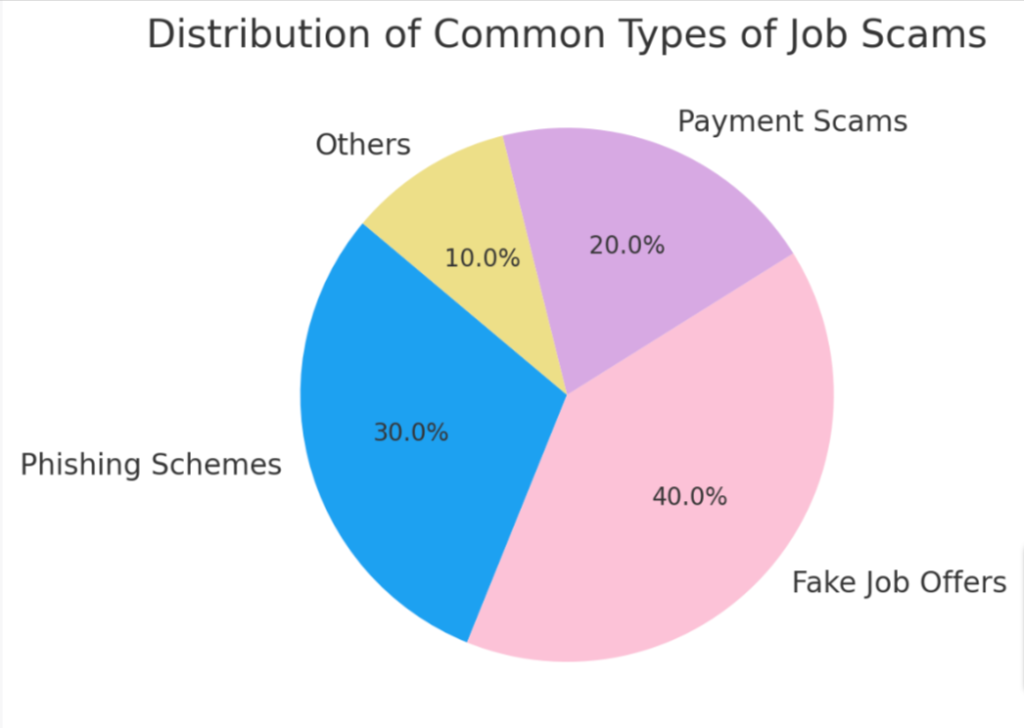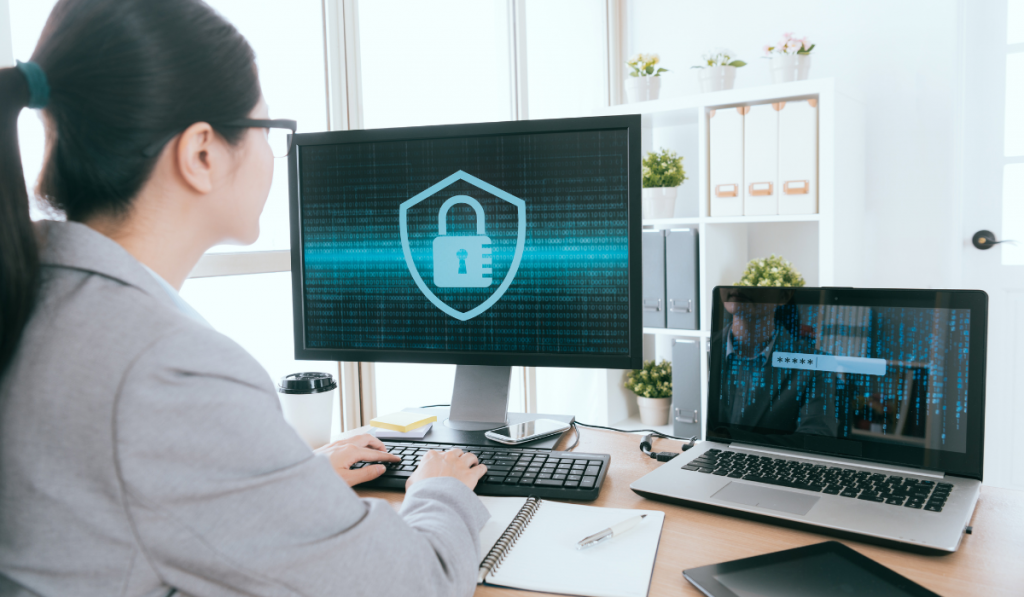Navigating the Minefield: Identifying Scams in Remote Social Media Jobs
Introduction
The digital revolution, coupled with unforeseen global events, has significantly reshaped the employment landscape. Remote work, once a novel concept, has transitioned into a mainstream employment model, with many professionals cherishing the flexibility and autonomy it offers.
At the forefront of this transformation is the rise of jobs in the social media realm. As businesses scramble to establish a robust online presence, the demand for social media managers, content creators, and digital marketers has surged.
Yet, as with any paradigm shift, there are challenges to navigate. The allure of remote social media jobs has not gone unnoticed by opportunistic scammers, preying on enthusiastic job seekers. From too-good-to-be-true offers to intricate phishing schemes, the digital job hunting arena is fraught with pitfalls that can ensnare even the most vigilant.
This article endeavors to shine a light on the dark corners of remote social media job scams, offering insights, red flags, and protective measures to ensure your job hunting journey remains both successful and safe. As we delve deeper, we’ll equip you with the tools and knowledge to discern genuine opportunities from deceptive traps, empowering you to navigate the digital employment landscape with confidence and caution.
The Attraction of Remote Social Media Jobs
The digital age has ushered in a plethora of opportunities, with social media emerging as a dominant force in both personal and professional spheres. As brands, businesses, and even individuals vie for attention in this bustling online marketplace, the role of social media professionals has become paramount. Let’s explore the factors that make remote social media jobs so attractive and sought-after.

The Exponential Growth of Social Media Platforms
Over the past decade, platforms like Facebook, Instagram, Twitter, and LinkedIn have witnessed staggering growth. What started as spaces for personal interactions have morphed into powerful business tools. Companies, irrespective of their size or industry, recognize the importance of a strong online presence. From startups to multinational corporations, there’s a unanimous push towards creating engaging content, building communities, and fostering brand loyalty online.
Necessity for a Robust Online Presence
In today’s digital-first world, a brand’s online reputation can make or break its success. Positive engagement on social media can catapult a brand to stardom, while negative feedback can lead to a swift downfall. This dynamic landscape necessitates skilled professionals who can navigate the nuances of online interactions, craft compelling narratives, and drive engagement.
Benefits of Remote Work in Social Media
- Flexibility: One of the primary draws of remote work is the flexibility it offers. Social media jobs, often governed by outputs rather than fixed hours, align perfectly with this model. Whether you’re a night owl or an early riser, you can tailor your schedule to your most productive hours.
- Global Opportunities: Working remotely in the social media domain eliminates geographical constraints. A content creator in Australia can seamlessly work for a brand based in Europe, broadening horizons and opportunities.
- Diverse Clientele: Remote social media professionals often have the liberty to work with a diverse set of clients. From local businesses to global giants, there’s a vast spectrum of work available, allowing professionals to hone their skills, adapt to different brand voices, and build an impressive portfolio.
- Cost Savings: Remote work eliminates commuting costs, wardrobe expenses, and daily meal costs, leading to significant savings. Moreover, companies also save on infrastructure, which often translates to better pay for remote employees.
In essence, remote social media jobs present a blend of creative challenges, lucrative opportunities, and unparalleled flexibility. It’s no wonder that they’ve become some of the most coveted positions in the modern job market. However, this very allure makes them a prime target for scammers, underscoring the need for vigilance and discernment.
Common Types of Remote Social Media Job Scams
The increasing demand for remote social media roles has inadvertently opened the floodgates for a slew of scams targeting eager job seekers. These scams often play on the desires and anxieties of individuals looking to secure lucrative positions in the digital domain. Familiarizing oneself with the most prevalent scams can be the first line of defense against these deceptive practices.
The “Too-Good-to-Be-True” Job Offer
We’ve all come across them: job listings promising exorbitant salaries for minimal effort, often requiring no experience. These offers are designed to entice and are usually laden with hidden traps.
- Red Flags: Exceptionally high pay for entry-level positions, promises of rapid promotions, or guarantees of high income within short periods.
- The Catch: Often, these ’employers’ will ask for personal details, bank information, or even initial ‘investment’ costs, only to disappear once they have what they want.
Fake Recruitment Agencies
Masquerading as intermediaries between companies and potential employees, these fake agencies promise to connect job seekers with high-paying roles—after an upfront fee, of course.
- Red Flags: Agencies demanding payment for their services (legitimate recruitment agencies usually charge the employer, not the job seeker), lack of verifiable contact information, and generic or template testimonials.
- The Catch: Once the fee is paid, either the job listings prove to be fictitious, or the agency becomes unresponsive.

Phishing and Data Harvesting
These scams are less about the job and more about extracting sensitive information from unsuspecting individuals.
- Red Flags: Unsolicited job offers sent via email, hyperlinks leading to dubious websites, requests for extensive personal or financial information in the initial stages.
- The Catch: Cybercriminals use this data for identity theft, unauthorized transactions, or even sell it on the dark web.
Payment for Training or Software
Some scammers exploit the eagerness of job seekers by offering positions that require proprietary software or training—available only after a fee is paid.
- Red Flags: Mandatory training sessions or software that isn’t available freely or through recognized platforms, urgency to make the payment, lack of clear refund policies.
- The Catch: After the payment, either the training proves worthless, the software nonfunctional, or the ’employer’ becomes unreachable.
Non-Payment for Completed Work
In these scams, the job seems legitimate, the tasks real, but once the work is submitted, the remuneration never comes.
- Red Flags: Lack of formal contracts, communication solely through messaging apps or emails, evasiveness when discussing payment details.
- The Catch: The scammer receives completed work—be it graphics, content, or social media strategies—and disappears without compensating the worker.
Awareness of these common scams is instrumental in safeguarding oneself against potential pitfalls. By understanding the tactics employed by scammers and recognizing the warning signs, job seekers can approach remote social media opportunities with caution and confidence.
Red Flags and Warning Signs
As the saying goes, “Forewarned is forearmed.” In the realm of remote job hunting, being aware of red flags can be the difference between securing a legitimate opportunity and falling prey to a scam. These warning signs act as beacons, alerting job seekers to potential pitfalls and helping them navigate the complex digital landscape safely.
Vague Job Descriptions and Requirements
Every legitimate job has specific roles, responsibilities, and requirements. Scammers, however, often use vague or generic descriptions to cast a wide net, hoping to attract as many unsuspecting individuals as possible.
- Red Flags: Job listings lacking detailed responsibilities, requirements that are overly broad or don’t align with the position, or descriptions that seem copied or generic.
High Salaries with Little to No Experience
While everyone dreams of a high-paying job, it’s essential to be realistic. Offers that promise hefty paychecks for roles requiring minimal experience or skill should be approached with skepticism.
- Red Flags: Disproportionate salary-to-experience ratios, promises of quick financial gains, or benefits that seem too lavish for the role in question.
Unprofessional Communication
Professionalism is a hallmark of legitimate businesses. If your interactions with a potential employer are riddled with unprofessionalism, it’s a significant red flag.
- Red Flags: Emails with numerous typos or grammatical errors, lack of formal communication channels (relying solely on messaging apps), generic or impersonal greetings, or communication that seems rushed or pushy.
Pressure to Make Quick Decisions
Scammers often operate on the principle of creating urgency. By pressuring job seekers to make swift decisions, they hope to prevent them from spotting inconsistencies or conducting thorough research.
- Red Flags: Urgent deadlines for accepting offers, pressure to pay fees immediately, or aggressive tactics pushing for quick commitment.
Suspicious Interview Methods
While remote interviews are standard for remote positions, the platforms and methods used can reveal a lot about the legitimacy of the offer.
- Red Flags: Reliance on obscure or non-professional platforms for interviews, lack of video interviews for roles that should reasonably require them, or interviews that lack depth and don’t adequately assess your skills or experience.
By staying vigilant and recognizing these warning signs, job seekers can drastically reduce the risk of falling victim to scams. It’s essential to trust your instincts; if something feels off or seems too good to be true, it warrants further investigation. Taking the time to verify and research can save not only money but also the disappointment and frustration that comes with being scammed.

5. How to Protect Yourself from Scams
In the digital age, where opportunities and pitfalls coexist, protecting oneself becomes paramount. By adopting proactive measures and fostering a discerning approach, job seekers can navigate the remote job landscape confidently. Here are some essential tips to shield yourself from potential scams:
Research the Company
Before committing to any job offer, it’s vital to conduct thorough research on the company or individual making the offer.
- Company Website: Legitimate businesses usually have a professional online presence. Examine the company’s official website for details about its operations, team, and past projects.
- Online Reviews: Platforms like Glassdoor or Indeed can offer insights into the company’s reputation. While every company might have a mix of reviews, consistent negative feedback or reports of scams should raise alarms.
- Contact Information: Ensure the company has verifiable contact details. A legitimate business should have a physical address, official email domain, and a working phone number.
Avoid Paying Upfront Fees
Genuine job offers rarely, if ever, require candidates to pay upfront fees, whether for training, software, or other reasons.
- Red Flag: Any job that demands payment before you start is a potential scam. Remember, you should be paid for your skills and time, not the other way around.
Be Wary of Unsolicited Offers
While it’s possible to receive job offers out of the blue, especially if you have a strong online presence, it’s essential to approach such offers with caution.
- Red Flag: Unsolicited emails, especially from unknown senders or those with generic email domains, should be scrutinized. Check for the specifics of the job offer and how the sender found your details.
Use Secure and Recognized Platforms for Job Hunting

Relying on reputable job boards or platforms that vet their listings can significantly reduce the risk of encountering scams.
- Recommended Platforms: Websites like LinkedIn, Remote.co, We Work Remotely, or FlexJobs have established reputations and offer a range of legitimate remote job listings, including those in social media.
Trust Your Instincts
Sometimes, even if everything seems fine on the surface, you might have an underlying feeling of unease.
- Red Flag: If something feels off or raises doubts, trust your instincts. It’s always better to be safe and conduct additional research or even decline an offer if it doesn’t feel right.
Arming yourself with knowledge and maintaining a healthy skepticism can go a long way in ensuring your remote job hunting experience is both safe and successful. By following these protective measures, you can focus on genuine opportunities and avoid the snares of deceptive scams.
Steps to Take if You’ve Been Scammed
Realizing you’ve fallen victim to a scam can be both disheartening and distressing. However, it’s crucial to remember that you’re not alone, and there are actionable steps you can take to mitigate the impact and prevent others from facing a similar fate. Here’s a roadmap to follow if you suspect you’ve been ensnared by a job scam:
Report the Scam
- Local Authorities: Depending on the nature of the scam, especially if money or personal information was involved, report the incident to your local police or appropriate authorities. They may provide guidance on the next steps or even launch an investigation.
- Online Platforms: If you found the job listing on a specific platform or website, report it immediately. This can help in removing the scam listing and preventing others from being duped.
Alert Your Bank or Financial Institution
If the scam involved any monetary transactions or if you provided banking details, it’s crucial to act swiftly.
- Immediate Action: Contact your bank or credit card company to report the fraudulent activity. They can guide you on measures to protect your funds, such as blocking transactions or even issuing a new card.
Enhance Your Online Security

Scams often involve the harvesting of personal data, which can be used for further fraudulent activities.
- Change Passwords: Update passwords for your email, bank accounts, and any other critical platforms. Consider using a password manager for added security.
- Monitor Your Accounts: Keep a close eye on your bank and credit card statements for any unauthorized transactions. Also, monitor your email and social media accounts for suspicious activities.
Share Your Experience
While it might be difficult to talk about being scammed, sharing your experience can be cathartic and beneficial for others.
- Online Communities: Platforms like Reddit, Quora, or even LinkedIn have communities where individuals share their experiences with scams. Your story could serve as a cautionary tale for others.
- Reviews: If the scam was associated with a specific website or “company,” leaving reviews on platforms like Glassdoor, Trustpilot, or the Better Business Bureau can warn potential victims.
Educate Yourself
Use this experience as a catalyst to educate yourself further about online scams. The more you know, the less likely you are to fall for a scam in the future.
- Stay Updated: Scams evolve over time. Stay updated with the latest scam tactics and techniques by subscribing to relevant newsletters or joining online communities focused on cybersecurity.
While being scammed can be a traumatic experience, it’s essential to approach the situation proactively. By taking the steps outlined above, you can mitigate the impact, protect yourself from further harm, and potentially shield others from facing a similar ordeal. Remember, scams thrive in silence; by speaking out and taking action, you’re reclaiming your power and contributing to a safer online community.
Conclusion
In the expansive digital realm, the convergence of immense opportunities and potential pitfalls is inevitable. The allure of remote social media jobs, marked by flexibility, global outreach, and lucrative prospects, has been undeniable. However, this allure has also cast shadows of deceit, where scammers lurk, seeking to exploit eager job seekers.
As we’ve journeyed through this article, we’ve illuminated the dark corners of these scams, unraveling their tactics and revealing the red flags that signal their deceit. From too-good-to-be-true offers to intricate phishing schemes, the landscape is riddled with traps. But with knowledge as our compass, we can navigate this terrain with discernment and confidence.
Protecting oneself from scams isn’t just about avoiding pitfalls—it’s about empowerment. It’s about approaching the digital job market armed with information, vigilance, and a community of informed individuals who share and learn from each other’s experiences. It’s about understanding that while scams exist, so do genuine opportunities, and with the right approach, the latter can be realized without falling prey to the former.
So, as you venture forth into the world of remote social media job hunting, carry with you the insights from this article. Approach each opportunity with a critical eye, trust your instincts, and remember that genuine employers value your skills and won’t shroud their offers in secrecy or ambiguity.
Here’s to a safe, successful, and fulfilling job hunting journey in the dynamic world of social media!

Call to Action
Navigating the digital job market can be both exhilarating and daunting. But remember, the strength of the online community lies in its collective wisdom and shared experiences. As we conclude this exploration into remote social media job scams, we urge you to be both a learner and a guide. Here’s how you can contribute and benefit from this ever-evolving digital community:
- Share the Knowledge: If this article has equipped you with insights, consider sharing it with your network. By spreading awareness, you’re not just helping others safeguard themselves but also creating a more informed and vigilant community.
- Engage in the Comments: Have you encountered a scam that wasn’t mentioned here? Or perhaps you have tips that could benefit others? Use the comments section below to share your experiences, ask questions, or provide additional insights. Remember, every shared experience adds a layer of protection for someone else.
- Stay Updated: The digital realm is dynamic, with scam tactics evolving continually. Consider subscribing to our newsletter or joining our community forums where we regularly discuss the latest in job market trends, scams, and best practices.
- Educate Others: Consider hosting webinars, workshops, or informal discussions within your local community or online groups, emphasizing the importance of online vigilance in the job market. Collaborative learning can be an effective tool in combating scams.
- Trust, but Verify: Always approach job offers with a mix of optimism and caution. Trust in the potential of genuine opportunities, but never hesitate to verify the authenticity of an offer.
In the end, the digital job hunting journey is as much about individual aspirations as it is about community well-being. Let’s commit to creating a transparent, supportive, and scam-free environment where professionals can pursue their dreams without fear. Dive into the digital job market, make your mark, and always remember: together, we’re stronger against scams.

